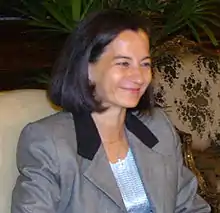Clara Rojas
Clara Leticia Rojas González (born December 20, 1964) is a Colombian lawyer, university lecturer, and campaign manager for former senator and presidential candidate Ingrid Betancourt. She was kidnapped along with Betancourt by the FARC guerrilla group near San Vicente del Caguán on February 23, 2002, while Betancourt was campaigning for the presidency. After the kidnapping, Rojas was named as Betancourt's vice-presidential candidate.
Clara Rojas | |
|---|---|
 Clara Rojas | |
| Born | Clara Leticia Rojas González December 20, 1964 Bogotá, Colombia |
| Nationality | Colombian |
| Alma mater | Our Lady of the Rosary University |
| Occupation | Lawyer |
| Known for | Colombian Vice Presidential candidate, kidnapping survivor. |
| Children | Emmanuel Rojas |
| Parent | Clara Leticia González |
In 2006, it was revealed that Rojas had given birth to a boy named Emmanuel while in captivity. The father is a FARC guerrilla.[1]
Rojas had last been seen publicly in a video released by the guerrilla group in 2003. However, on January 10, 2008, Rojas and former congresswoman Consuelo González were freed after six years in captivity. Betancourt was rescued on July 2, 2008.
Operation Emmanuel
On December 27, 2007, the FARC guerrilla group was said to be planning the imminent release of Rojas, together with her son and congresswoman Consuelo González, in a one-sided prisoner release negotiated by Venezuelan president Hugo Chávez.
Chavez planned their release in an operation dubbed Operation Emmanuel, using Venezuelan aircraft and with the support of the Red Cross.
Delay
The FARC delayed the release of the hostages because the child, Emmanuel, was missing. According to reports, the FARC had placed the child in custody of a peasant family, and he could not be found in time for the scheduled hostage release. In the meantime, the Colombian government learned that a child fitting Emmanuel's description was in the custody of the Colombian Institute for Family Welfare (ICBF) on December 31, 2007. On January 2, 2008, the government called the FARC's bluff and verified that the child was Emmanuel. Subsequently, on January 4, according to the Colombian government, the child was subjected to a mitochondrial DNA test. According to the Institute of Legal Medicine of Colombia, the test verified that he is in fact Clara Rojas' son.[2] FARC subsequently confirmed this. Emmanuel had become ill as a baby, and Rojas had allowed her son to be taken to a doctor for care on the condition that he would be returned to her. Instead, he was placed into the care of a peasant who did not know to whom the child belonged.
Release
After being temporarily suspended, Operation Emmanuel resumed, and on January 10, 2008, a humanitarian commission headed by the International Committee of the Red Cross flew in two Venezuelan helicopters to a location in Colombia that FARC had designated the previous day. Rojas and González were then released to the care of the commission.[3][4][5][6][7][8][9][10][11][12][13] On January 13, 2008, Rojas was reunited with Emmanuel; it was the first time she had seen her son after being parted from him for more than two years.[14]
Political career
Rojas was a candidate for Congress in Colombia's March 2014 election. She was also a candidate for Vice President at one point.[15][16]
Memoir
Rojas' ordeal is described in the book "Captive" (2010).[17]
See also
References
- “The Colombian Politician With An Incredible Back Story” NPR [25-02-2014]
- "Niño en poder de Gobierno sí es el hijo de Clara Rojas; así se confirma tesis de Uribe de por qué las Farc no liberaron rehenes". El Tiempo. January 4, 2008. Retrieved December 8, 2013.
- www.miamiherald.com/news/breaking_news/story/373967.html
- "Colombian hostages freed, reunited with families". AFP. Retrieved January 1, 2012.
- "Freed hostages in Venezuela". CNN. January 10, 2008. Retrieved January 1, 2012.
- Mander, Benedict (January 10, 2008). "Financial Times: Farc hands over female hostages". Financial Times. Retrieved January 1, 2012.
- Rory Carroll in Caracas and Sibylla Brodzinsky in Bogotá (January 11, 2008). "Unlimited: Chávez wins freedom for Colombian hostages". The Guardian. UK. Retrieved January 1, 2012.
- Romero, Simon (January 10, 2008). "International Herald Tribune2 hostages are released by Colombian guerrillas". International Herald Tribune. Retrieved January 1, 2012.
- "Freed hostages land in Venezuela". BBC News. January 11, 2008. Retrieved January 1, 2012.
- Yahoo News: 2 hostages freed by Colombian rebels Archived January 15, 2008, at the Wayback Machine
- Romero, Simon (January 11, 2008). "New York Times: Colombian Rebels Free 2 Hostages". The New York Times. Colombia;Venezuela. Retrieved January 1, 2012.
- Munoz, Daniel (January 11, 2008). "Colombia rebels free two hostages from jungle". Reuters. Retrieved January 1, 2012.
- USA Today -video-: Colombian rebels free 2 hostages
- James Orr and agencies (January 14, 2008). "Freed Colombian hostage reunited with son". The Guardian. UK. Retrieved December 8, 2013.
- "Ex-Colombia hostage tells her tale". December 19, 2008.
- "Pope Francis arrives in Colombia in effort to help heal wounds of 50-year war - the Globe and Mail". beta.theglobeandmail.com. Archived from the original on September 7, 2017. Retrieved January 13, 2022.
- Rojas, Clara. (2010). Captive : 2,147 days of terror in the Colombian jungle (1st Atria paperback ed.). New York: Atria Paperback. ISBN 978-1-4391-5695-7. OCLC 437300274.
External links
- The New York Times
- Boy Born to Rebel Hostage Shocks War-Weary Colombia
- CNN World edition